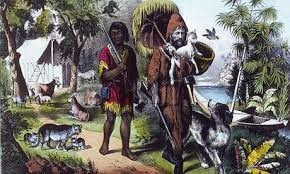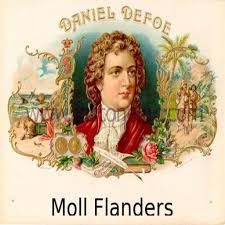Daniel Defoe (c.1660 – 1731), was an English trader, writer, journalist, pamphleteer, and spy, most famous for his novel Robinson Crusoe.
Defoe is noted for being one of the earliest proponents of the novel, as he helped to popularize the form in Britain with others such as Samuel Richardson, and is among the founders of the English novel.
He was a prolific and versatile writer, producing more than five hundred books, pamphlets, and journals on various topics, including politics, crime, religion, marriage, psychology, and the supernatural. He was also a pioneer of economic journalism.
Robinson Crusoe, first published on 25 April 1719, is a novel by Daniel Defoe. The first edition credited the work's protagonist Robinson Crusoe as its author, leading many readers to believe he was a real person and the book a travelogue of true incidents.
It was published under this full title:
The Life and Strange Surprizing Adventures of Robinson Crusoe, Of York, Mariner: Who lived Eight and Twenty Years, all alone in an un-inhabited Island on the Coast of America, near the Mouth of the Great River of Oroonoque; Having been cast on Shore by Shipwreck, wherein all the Men perished but himself. With An Account how he was at last as strangely deliver'd by Pyrates.
Epistolary, confessional, and didactic in form, the book is presented as an autobiography of the title character (whose birth name is Robinson Kreutznaer)—a castaway who spends thirty years on a remote tropical island near Trinidad, encountering cannibals, captives, and mutineers, before ultimately being rescued.
Despite its simple narrative style, Robinson Crusoe was well received in the literary world and is often credited as marking the beginning of realistic fiction as a literary genre. Before the end of 1719, the book had already run through four editions, and it has gone on to become one of the most widely published books in history, spawning numerous sequels and adaptations for stage, film, and television.
A handful of novels followed soon after—often with rogues and criminals as lead characters—including Moll Flanders, Colonel Jack, Captain Singleton, Journal of the Plague Year and his last major fiction piece, Roxana (1724).
Follow for Daily Literary news and History.
Building Great Collections, One Fine Book at a Time
Visit us at BlindHorseBooks.com
#RobinsonCrusoe #DanielDefoe #TodayInLiteraryHistory







Comments
Post a Comment